Aston Martin DB12 Volante First Drive Review: Drop top, go fast, don't crash

MALIBU, Calif. – The 2024 Aston Martin DB12 Volante may have a 12 in its name, but there are only eight cylinders pumping away under the hood. They’re turbocharged cylinders, though, and thanks to a wealth of upgrades to the AMG-sourced 4.0-liter, they make just a wee bit more horsepower than they did in the DB11. How does an extra 143 sound? That brings the grand total to 671 hp, along with 590 pound-feet of torque, both of which are also considerably more than the DB11’s old V12 option.
Now, while a lot of brands would get to that level of absurd performance and call in the front-axle cavalry, Aston Martin is sticking to its guns hidden behind the headlights. All 671 of those horses still go exclusively to the rear wheels. If you want an all-wheel-drive Aston Martin, the DB you’re looking for has an X on the end.
In related news, it had just rained in the Santa Monica Mountains before my drive. A lot. Typically arid and beige hills were as damp and green as Aston’s homeland. Every third or fourth turn on the various twisting roads had little streams bisecting their apexes … and that’s if the road was open at all. My usual testing playground and photo location were closed due to some mud-related calamity. So, to put it mildly, this particular combination of car and conditions was not ideal, leaving little opportunity to test out its new 3.6-second sprint to 60 mph. Just as it seemed I had driven far enough to dry off the fat Michelin Pilot S 5 tires, I’d hit another mid-turn stream, greasing them up again with water and mud. Now seems like a good time to mention that the DB12 Volante starts at $265,000. This one goes for $323,700.

It’s not just the nutty amount of power and immediate, turbocharged torque going to the rear wheels that makes the DB12 such a nail-biter in conditions like this. It’s the fact that it’s so civilized and sedate to drive, a testament to the grand-touring nature of Aston Martin’s DB cars. It’s not some hypercar with a hair-trigger throttle, jarring shifts or teeth-chattering ride that quite obviously is raring to rip your face off if you’re not careful. No, it’s a monster in disguise. Or an assassin, if you prefer. I had to keep reminding myself of that, as one “whoa there” stability control moment while I wasn’t actually pushing the thing was more than enough for me on this day.
So yeah, try to avoid driving the DB12 Volante in the rain. And really, it is a Volante after all, which means “flying” in Italian but “convertible” in Aston Martin. I’m guessing most owners will only back it out of their 10-car garages on days that look more like the one Aston Martin chose to shoot all these pictures. When those owners do venture out, they’ll be able to enjoy an unencumbered presentation of the DB12’s three-mode exhaust, which you alter by drive mode (Comfort, Sport, Sport+) or manually with a button on the very Porsche-like center console. It sounds brilliant when you lay into the V8, with the odd rumble and pop in the most aggressive setting when braking hard (that button glows either orange, red or not at all to indicate which setting it’s in), but it isn’t flamboyant or obnoxious at a steady cruise or even accelerating normally. Again, this is a grand tourer.
And whilst grand touring with the top down, the cabin remains pleasantly wind-free as long as you roll up the side windows and install the pop-up wind deflector. The latter takes up space in the trunk when not in use, but it’s hard to see why you’d ever remove the thing. It certainly isn’t to use the back seat, because only small dogs can fit back there, and they’d probably be cozier under the wind deflector anyway. Still, it should at least be mentioned that Porsche manages to integrate a hidden, power-deploying wind deflector in the 911 Cabriolet.
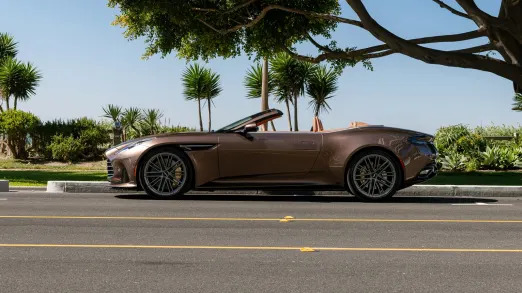
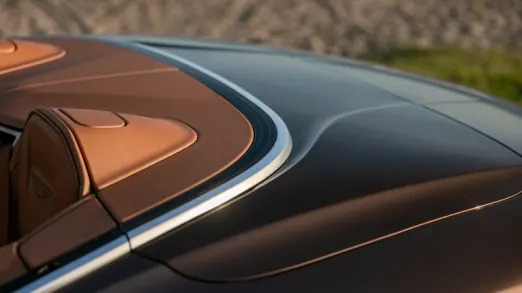
Should the sun become too much, or, in my case, it starts to rain, the eight-layer roof can be deployed in 16 seconds at speeds up to 31 mph. Sure, most convertibles have been able to do this for ages, but it’s still a baller move. It also disappears below its tonneau cover in 14 seconds while moving, or, if you prefer, by using the remote within a 2-meter radius. Frankly, I think the brand that named its customization division after James Bond’s gadget master should be able to do better than that. Like, from 10,000 feet while I’m parachuting out of a crippled Gulfstream. Just spit-balling here.
Available in black, red, blue or “black and silver,” the cloth roof features eight layers of acoustic insulation. It does its job. Sadly I didn’t when I failed to take a photo of it, but then, neither did Aston Martin. You’ll just have to imagine it. Anyway, there is remarkably little wind noise with the roof up, although any noise that sneaks through is bound to be overwhelmed by the ample road noise from the Michelins. Given the grand touring goal, I’d probably try and find some quieter rubber. Maybe something with a little extra rain capability while I’m at it.
It should also be said how well the Volante maintains the DB12’s svelte silhouette with and without the roof in place. It looks like it was always meant to be a convertible, which it was, but that isn’t always the case. Aston Martin says the main dynamic differences between coupe and convertible are rear spring rates and damper tuning. That was done to ensure comparable dynamics, however, rather than create a “softer option,” as chief technical officer Roberto Fedeli says. Not that I was really in a position to know for sure without a Coupe on hand, and with the roads, well, in less-than-favorable condition, but the Volante definitely doesn’t feel soft. Aston Martin increased the bandwidth between the comfort and sport settings of the adaptive dampers from DB11 to DB12, but I was actually surprised that Comfort isn’t a little cushier than it is. The DB12 is not a Bentley, you always feel the road, and some may even say too much at times. It actually reminded me of the “Casino Royale”-era DBS rather than the contemporary DB9, which perhaps indicates how long it’s been since I’ve driven a DB car without an X on the end.
No complaints about road feel from the steering, as Aston Martin once again proves its mastery of that particular art and science. It is utterly friction-free, smooth and fluid in its motion, expressing the nuances of the road through weighting that I’m sure some would deem “too light.” It doesn’t change with drive mode, either. Good.
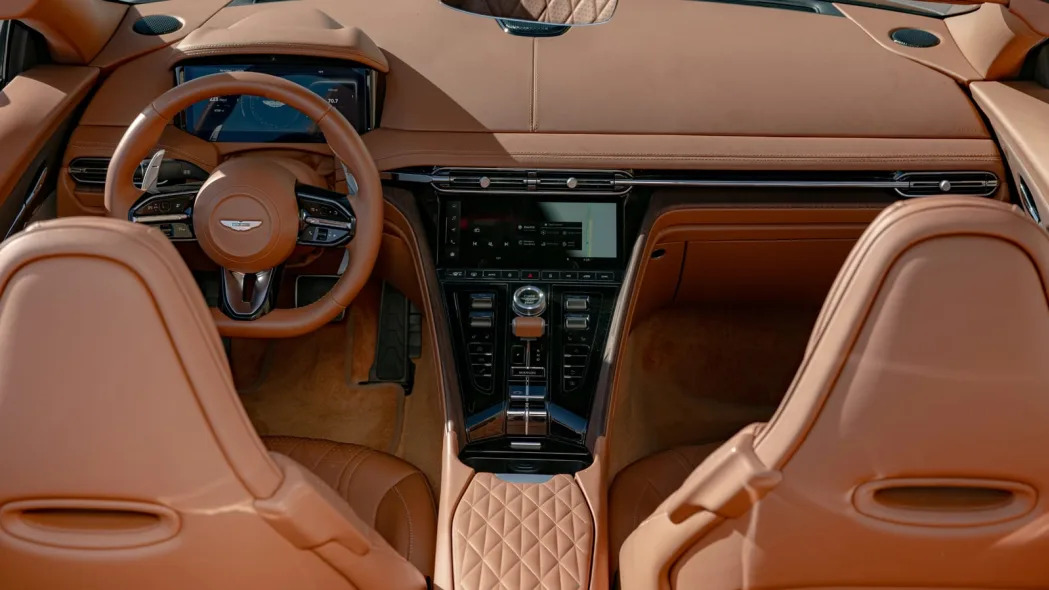
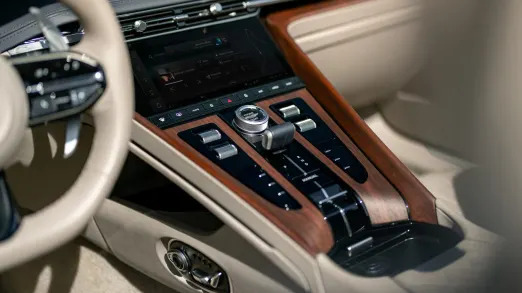
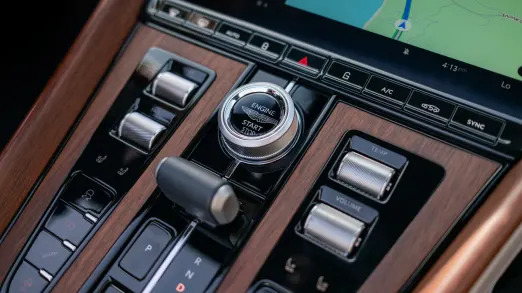
Ultimately, Aston Martin’s greatest achievement with the DB12 is the interior. While there has been an abundance of beautiful leather and veneer since the DB9 kicked off the brand’s modern renaissance, switchgear has been awfully meh, and the electronics usually borrowed from some corporate partner. It was Volvo in the DB9 days and most recently Mercedes. The new interior is genuinely Aston Martin, albeit with more than a little inspiration drawn from the last generation of Porsche interior design. The rising center console festooned with buttons is a sort of mash-up of Panamera and 991 911. There are fewer buttons than those, so zero complaints here. It’s a great layout. The touchscreen beyond them is, well, a touchscreen as opposed to a display controlled by a COMAND knob/touchpad from multiple Mercedes generations ago (as the DBX and Vantage continue to have). It is the first infotainment system Aston Martin has ever developed in-house, and although I didn’t get a chance to use it a great deal, it gets the basics right – including offering both Apple CarPlay and Android Auto – without any obvious annoyances. That’s quite the achievement because “small car maker makes its own infotainment system” is usually a recipe for pulling one’s hair out.
The overall design is also lovely, with the downward-sloping dash helping to provide a less claustrophobic feeling in the low-slung cockpit. The dramatically new dash also results in Aston Martin finally retiring the huge PRND shift buttons embedded front and center on the dash with the start button in the middle. That was a mildly interesting design in 2005 when you had to insert the “Emotion Control Unit” key into the dash to start the car, but it’s just a terrible UI in 2024 (or 2014) that takes up too much real estate. The new shifter is a little monostable tab on the center console (hello to Porsche once again) with Park and Manual buttons below, and the start button above encircled by the drive mode selector knob. There are also beautifully tactile shift paddles.
Of course, there’s no shortage of customization that can be done and cows-worth of leather to apply everywhere in oh-so-many color options. The nice thing is that the interior no longer has to rely on those options to distract from its mundane bits. The new one looks, feels and acts the part. And that’s probably the most definitive conclusion I was going to get on that slick day driving through damp Malibu. The new DB12 Volante is quite obviously an extraordinarily expensive car, but with the LOL power output and proper cabin, it now justifies its price point beyond the usual reasons of sexy looks, exclusivity and the right to say “let’s take the Aston.”







